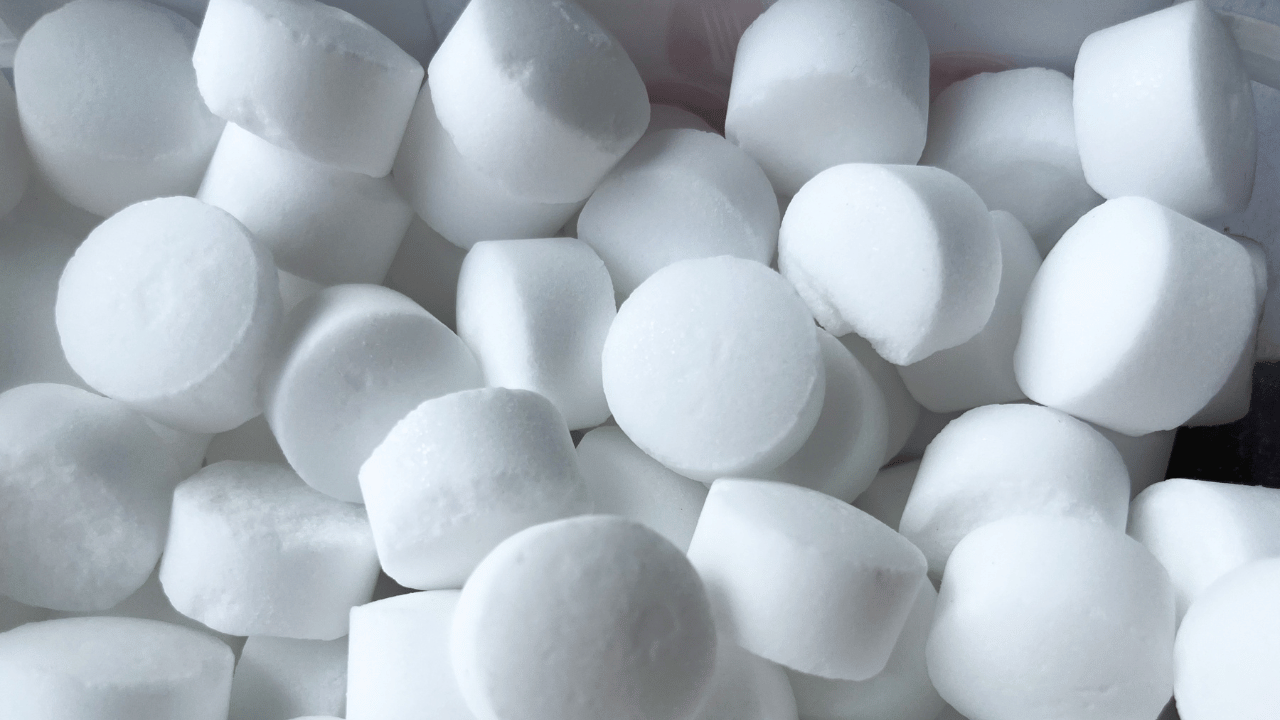Discover the Perfect Salt Solution for Your Home in San Antonio Texas
You deserve water that’s as pure as your standards. Let our specialists guide you in choosing the optimal salt for your water softener, ensuring efficiency, safety, and lasting performance. Contact us today to elevate your water quality.
Water Softener Salts Compared: Sodium vs Potassium, Pellets vs Crystals
Hard water silently drains efficiency from your home—clogging pipes, scaling appliances, and dulling detergents. A water softener fixes that, but the salt you load into the brine tank determines how well it performs, how often you maintain it, and what you spend over time. Not all salts are created equal.
This comparison cuts through the noise. We break down sodium chloride vs potassium chloride and the main salt forms—rock, solar, evaporated pellets, crystals, and blocks—so you understand purity, solubility, regeneration performance, residue, environmental considerations, dietary sodium impact, and total cost of ownership. By the end, you’ll know exactly which salt type aligns with your water hardness, system design, maintenance appetite, and sustainability goals.
Comparison Between Salts in Water Softeners: Sodium vs Potassium and Pellets vs Crystals

When you’re faced with hard water issues—think stiff laundry, scale on fixtures, and that stubborn soap scum—you’ve probably considered a water softener. But it doesn’t end the-re. Choosing the right salt is just as important as picking the right system. As someone who’s installed a fair share of softeners and experimented at home, I know firsthand how subtle these choices can be, yet how much they impact daily life and long-term maintenan-ce. Today, we’ll get practical about the big debate: sodium vs potassium, and the classic pellets vs crystals showdown. If you want clarity without fluff, you’re in the right place.
Sodium vs Potassium: Which Salt Should You Choose for Your Water Softener?
What’s the Difference?
At the heart of every water softener is a process called ion exchange. Basically, the system swaps out the minerals causing hardness—mainly calcium and magnesium—for something less troublesome. Typically, that “something” is either sodium chloride (table salt) or potassium chloride.
- Sodium chloride is the standard, affordable choice. It’s widely available, efficient, and gets the job done for most homes.
- Potassium chloride is the alternative, often chosen for health or environmental reasons. It’s pricier and slightly less efficient, but it appeals to those wanting to limit sodium in their water.
Why Does This Matter in Practice?
Let’s get real: for most people, sodium-based softeners make sense. They’re effective, economical, and straightforward. Data from the Water Quality Association shows that over 80% of US households with water softeners use sodium chloride because it’s 30–40% less expensive than potassium chloride (WQA, 2022). That said, some families—maybe you have someone with a sodium-restricted diet, as I did with my grandmother—take comfort in using potassium chloride, even if it means topping up the brine tank a bit more often and paying a higher price.
Practical Examples for Everyday Life
- Sodium chloride: Best for general use, especially if you’re softening water for laundry, dishwashers, and showers. One downside: softened water will have a slight sodium increase—usually around 20–30 mg per 8-ounce glass, according to the Mayo Clinic. For perspective, that’s far less than the sodium in a slice of bread.
- Potassium chloride: If you’re gardening with softened water, potassium can be a plus for your plants. But, if you have very hard water, you’ll notice that potassium softens less efficiently—meaning you’ll use more product and refill more often.
Actionable Tips
- Check your health considerations. If heart issues or sodium intake is a concern in your home, potassium is worth the investment.
- Read your softener’s manual. Not all systems are compatible with potassium chloride due to differences in solubility and crystallization.
- Monitor efficiency. In practice, I’ve found that switching from sodium to potassium often means keeping a closer eye on salt levels and regeneration cycles.
Pellets vs Crystals: What’s Best for Your Water Softener?
Breaking Down the Options
Once you’ve chosen your salt type, you’re not done yet—now you’ve got to pick a form. Walk down the aisle at any hardware store, and you’ll see bags labeled “Pellets” and “Crystals.” Here’s what sets them apart:
- Salt Pellets: Compressed, uniform, and low-dust. They dissolve slowly and prevent “bridging” (when salt clumps together and forms a hard crust).
- Salt Crystals: Coarser, less processed, and sometimes more affordable. They dissolve quickly, which can be helpful or problematic, depending on your system.
When Does Each Work Best?
From my own installs, I’ve seen that pellets are the safer choice for most modern softeners. They’re designed to keep the brine tank clean and flowing smoothly. Crystals, on the other hand, are better suited to older, less-demanding units or those with high water turnover.
Here’s a practical breakdown:
- Use pellets if:
- You have a new or high-efficiency softener.
- You run your softener on a predictable schedule.
- You want to minimize maintenance (less bridging, less cleaning).
- Use crystals if:
- You have an older system that struggles with pellets (read your manual).
- You want to avoid additives (most crystals are pure, with no anti-caking agents).
- You live somewhere warm and dry, reducing the risk of bridging.
A Firsthand Example
The first time I swapped from pellets to crystals, just to see if I could save a few bucks, I ended up with a salt bridge so solid I needed a hammer to break it up. Not fun. If you’re not sure, always start with pellets—especially if you’re not keen on troubleshooting.
Don’t Forget Additives
Some salts come with rust removers or cleaning agents. These can be helpful if you’re battling iron stains, but always check your softener’s compatibility before using anything extra.
Quick Checklist for Buying:
- Pellets: Less maintenance, ideal for most systems, slightly more expensive.
- Crystals: Cheaper, can cause bridging/clogs in some softeners.
- Purity matters: Higher purity means less residue and less tank cleaning.
Frequently Asked Questions
1. Is potassium chloride better than sodium chloride for water softeners?
Not necessarily. Potassium chloride is a good alternative for those on sodium-restricted diets or looking for a more eco-friendly option, but it’s more expensive and slightly less efficient. For most households, sodium chloride is the standard due to its cost-effectiveness and availability.
2. Should I use salt pellets or crystals in my water softener?
For most modern softeners, pellets are the recommended choice—they dissolve predictably and require less maintenance. Crystals can work in older systems or where cost is a major concern, but they may cause bridging or clogging if not monitored closely. Always check your user manual and consider your system’s design before deciding.
Final Thoughts
Choosing the right salt for your water softener isn’t just a technical decision—it’s about what works best for your family, your budget, and your lifestyle. Don’t be afraid to experiment, but start with what’s recommended for your specific softener. In practice, a little attention to these details saves a lot of headaches down the road. Use the right salt, check your softener regularly, and you’ll spend less time battling hard water and more time enjoying the benefits.
Choose with intention, not habit. For most households, high‑purity evaporated pellets (sodium chloride) deliver the best balance of efficiency, clean brine tanks, and lower maintenance. If you’re managing sodium intake or prioritizing landscaping and septic sensitivity, potassium chloride is a strong alternative—just expect to use slightly more and recalibrate settings. Skip low‑purity rock salt unless budget is the only driver, and use blocks only when your manufacturer specifies them. The right salt safeguards your resin, protects your appliances, and trims your utility bills—start optimizing your softener today.
Maximize Your Water Softener’s Potential with Pure Salt – Request a Free Estimate Today
Please use the form below to request a free estimate and we’ll be back in touch with you as soon as possible. Alternatively you can give us a call at (210) 960-2555 for immediate Pricing and scheduling.


